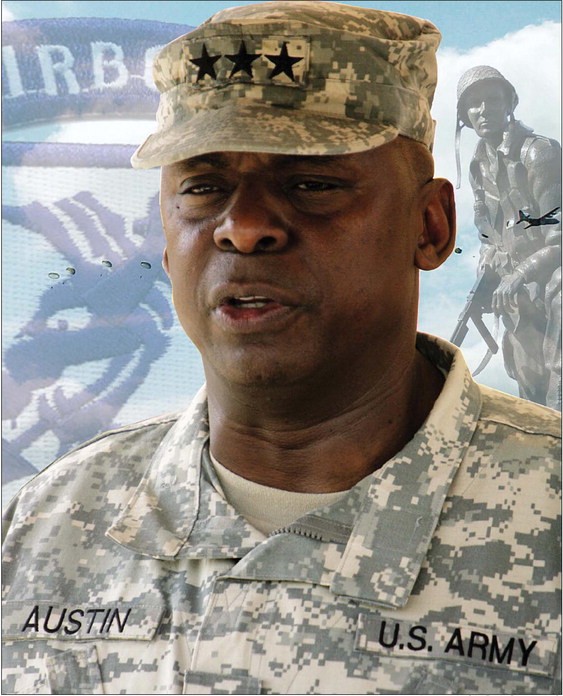After more than 30 months in command, Lt. Gen. Lloyd J. Austin III, 34th commander of the XVIII Airborne Corps and Fort Bragg, relinquished command to the deputy commanding general during a morning ceremony today at the Main Post Parade Field.
Throughout Austin's tenure, he was often praised by military and civilian leaders and Soldiers alike for his inspiring leadership and ability to make a positive difference in whatever mission he was given.
However, Austin is the first to point out that his achievements are not as much about him as they are a reflection of the outstanding teammates who supported him.
"I am absolutely proud of the work that has been done by this great corps headquarters," said Austin. "I am equally proud of all the great work that has been done by all the units on this post and our garrison staff who continues to make the lives of our Soldiers and Families better."
Austin assumed command of the XVIII Abn. Corps on Dec. 8, 2006 and from the outset; laid out a four-pronged and clear vision for the future of the corps and Fort Bragg.
During an interview July 29, Austin said he knew the headquarters and numerous brigades would deploy during his watch and so his first priority was to provide ready and trained forces to the fight both in Iraq and Afghanistan.
His second priority was transformation "When we reach the end of our transformational period, we will be a more capable and relevant corps headquarters that can more easily and quickly assume control of a joint force or a combined joint force, much the same way we did in Iraq," said Austin.
Austin's third priority was to ensure Fort Bragg remained the preA,A!mier power projection platform in the Army. "We needed to ensure that we had all the systems in place, that we had good accommodations for work spaces and living spaces for our troops, that we had great training areas and ranges that were relevant not only today, but 10 years from now, and that we maintained the ability to deploy rapidly."
Taking care of Soldiers and their Families was Austin's fourth priority. But he said that although he listed this fourth in order, taking care of Soldiers and Families is really at the top of the list. "If you just look around at the types of things that have been done to improve housing for our Families during the last 30 months, it is really astounding; and we continue to look for other things to do as we go along," said Austin.
Reflecting proudly on the corps headquarters' 15-month deployment to Iraq as the Multi-National Corps - Iraq, Austin said that period in the corps history was "decisive and historic."
"We wanted to make sure that we made a difference. We wanted to show physical progress, improve the Iraqi security forces and drive down the level of violence in Iraq and all of those things happened," explained Austin.
However, Austin was quick to point out that the corps could have lost the gains achieved by the surge brigades if it had not been for the focus and persistence of the team to keep moving forward. "We kept building on our gains and witnessed Iraqi's conduct successful elections. Today, Iraqis are more confident in their government and military."
Asked about his greatest challenge in Iraq, Austin responded, "When you command a corps consisting of seven divisions and 20 brigades and 160,000 troops in combat, the greatest challenge is maneuvering and fighting on a daily basis. It is a big deal and everyday is a different challenge."
Austin said he looked at the time he served at Fort Bragg fondly.
"This is the best job in the Army," said Austin. "I have enjoyed every day of it and every day of command has been a meaningful experience."
He also spoke fondly about the support of the communities.
"This is one of the best communities in America to work in. I felt from the beginning that the commu-nity embraced our Soldiers and Airmen." I have been impressed by the leaders of our 11 surrounding counties and the degree to which they reach out and try to take care of our Soldiers and they continue to look for ways to support our Families."
Austin reiterated that Fort Bragg must stay connected to the community to sustain this outstanding community support.
"We have to communicate to the community what our needs are and we need to give back to the community where we can. We have significant expertise in the ranks of the military and we want to put these skills to use to make our communities a better place to live.
"I am proud of the corps headquarters," said Austin, "the 82nd Airborne, and all the separate brigades. I am proud to have worked along side the special operation forces, they are great partners and they've distinguished themA,A!elves around the world, and I am very proud of the work our garrison staff has accomplished in the last two years and nine months."
Before leaving, Austin had one last message for the Soldiers with whom he had served with for the past two years "I am absolutely proud of what these Soldiers have done," said Austin. "I am honored and humbled to have had the ability to serve with them again. I think the airborne community is a tremendous place to work and serve and so I just ask them to keep doing what they are doing."
Austin and his team, made a difference in Iraq, made a difference in the lives of Soldiers and Families at Fort Bragg and developed some tremendous officers and noncommissioned officers along the way while creating an environment where people feel that Fort Bragg and the XVIII Airborne Corps is a good place to serve and live.


Social Sharing